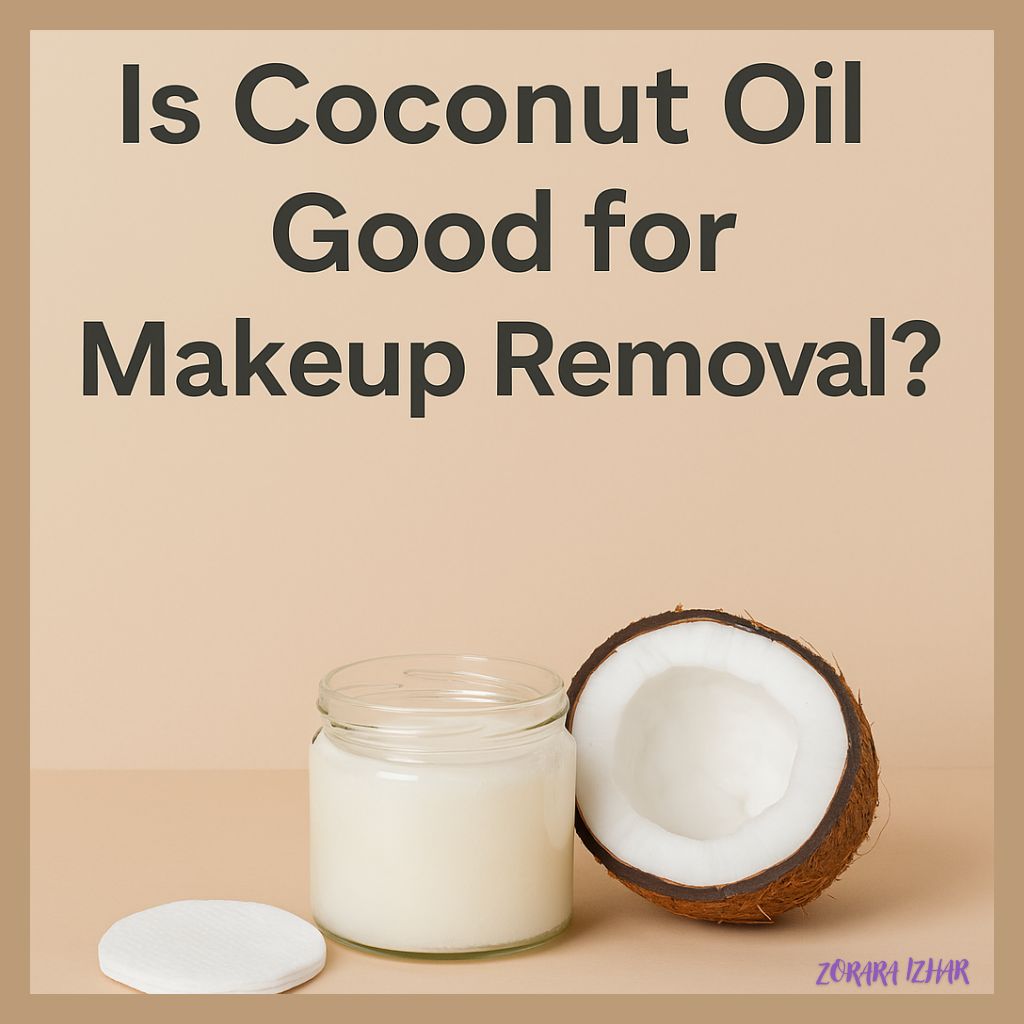30
May
Is Coconut oil good for makeup removal?
If you're on the hunt for a natural, effective, and affordable makeup remover, you’ve probably heard about coconut oil. But is coconut oil good for makeup removal?
Yes—coconut oil is not only good, it's excellent for removing even stubborn makeup like waterproof mascara, long-wear foundations, and matte lipsticks. It melts makeup effortlessly while nourishing your skin. In this guide, we’ll break down the science, benefits, risks, and tips for using coconut oil in your skincare routine.
Pro Tip: Use organic, cold-pressed virgin coconut oil for maximum benefits.
Dry skin : provides intense moisture
Sensitive skin : gentle and soothing
Oily or acne-prone skin : may clog pores for some individuals
Note: Non-comedogenic alternatives are better for acne-prone skin.
What Is Coconut Oil?
Coconut oil is a plant-based oil extracted from the meat of mature coconuts. It’s widely used in beauty, cooking, and medicine. Its high-fat content, primarily lauric acid, gives it antibacterial, antifungal, and moisturizing properties—making it a great multi-tasker in skincare.Why Coconut Oil Works for Makeup Removal
Coconut oil works well because makeup is oil-based. Traditional cleansers often struggle to break down oil-based products. But coconut oil binds to makeup, dirt, and excess oil, helping lift them from your skin. Key properties:- Emollient: Softens and soothes skin
- Antibacterial: Helps fight acne-causing bacteria
- Non-polar: Bonds well with stubborn waterproof formulas
Types of Coconut Oil You Can Use
| Type | Description | Best For |
|---|---|---|
| Virgin Coconut Oil | Unrefined, pure, and retains natural aroma | Sensitive & dry skin |
| Refined Coconut Oil | Processed and odorless | Oily or acne-prone skin |
| Fractionated Oil | Liquid form, long shelf life | Travel & easy use |
How to Use Coconut Oil to Remove Makeup
Step-by-Step Application- Scoop a small amount of coconut oil (solid or liquid).
- Warm between your fingers until it melts.
- Massage onto dry skin, focusing on eyes, lips, and heavy areas.
- Gently wipe with a warm, damp cloth or cotton pad.
- Cleanse again with a gentle facial cleanser (optional for double cleansing).
- Moisturize if needed.
Tips for Sensitive Skin
- Always do a patch test before full use.
- Avoid harsh rubbing, especially around the eyes.
- Use soft, organic cotton or a microfiber towel for wiping.
Benefits of Using Coconut Oil for Makeup Removal
- Effectively removes waterproof makeup
- Hydrates and nourishes the skin
- Natural and chemical-free
- Cost-effective
- Soothes irritated skin
- Reduces redness and inflammation
- Leaves skin soft and smooth
- Can help prevent premature aging
- Antibacterial and antifungal properties
- Great for travel (multi-use product)
- Safe for lips and eyes
Potential Drawbacks and Skin Concerns
While coconut oil is amazing, it's not for everyone. Watch out for:- Clogged pores (especially in oily or acne-prone skin)
- Greasy residue if not washed off properly
- Possible allergic reactions (rare)
Coconut Oil vs. Traditional Makeup Removers
| Feature | Coconut Oil | Traditional Removers |
|---|---|---|
| Ingredients | Natural, plant-based | May contain alcohol & synthetics |
| Skin benefits | Moisturizing, antibacterial | Often drying or irritating |
| Cost | Budget-friendly | Varies by brand |
| Effectiveness on waterproof makeup | High | Medium to high |
| Eco-friendliness | Highly sustainable | Depends on product |
 Best Skin Types for Coconut Oil Use
Best Skin Types for Coconut Oil Use
Dry skin : provides intense moisture
Sensitive skin : gentle and soothing
Oily or acne-prone skin : may clog pores for some individuals
Note: Non-comedogenic alternatives are better for acne-prone skin.
Can You Use Coconut Oil on Eye Makeup?
Absolutely. Coconut oil is safe for the delicate eye area, and it:- Removes mascara and eyeliner effortlessly
- Doesn’t sting or burn the eyes
- Helps condition eyelashes
Recommended Brands and Products
- Viva Naturals Organic Extra Virgin Coconut Oil
- Nutiva Organic Unrefined Coconut Oil
- Cocokind Facial Cleansing Oil
- Dr. Bronner’s Organic Virgin Coconut Oil
How Often Should You Use Coconut Oil?
You can use coconut oil daily if your skin tolerates it. However, for best results:- Use as a makeup remover at night
- Cleanse thoroughly afterward
- Monitor skin’s reaction over time
Natural Alternatives to Coconut Oil
If coconut oil isn’t for you, try:- Jojoba oil – closest to skin’s natural sebum
- Sweet almond oil – rich in vitamin E
- Olive oil – deeply hydrating
- Micellar water – gentle, non-oily alternative
DIY Coconut Oil Makeup Remover Recipe
Ingredients:- 2 tablespoons organic virgin coconut oil
- 1 tablespoon jojoba or almond oil (optional)
- 2 drops of tea tree oil (for acne-prone skin – optional)
- Mix all oils in a clean container.
- Store in a small jar with lid.
- Use a small scoop to apply as needed.
FAQs About Coconut Oil and Makeup Removal
Q1: Is coconut oil safe for all skin types? Not necessarily. It's great for dry or sensitive skin but may clog pores in oily or acne-prone skin. Q2: Can coconut oil remove waterproof mascara? Yes! It breaks down even the most stubborn waterproof formulas with ease. Q3: Do I need to wash my face after using coconut oil? Yes. It’s best to follow up with a gentle cleanser to avoid buildup or clogged pores. Q4: Can I leave coconut oil on my face overnight? You can, but it's better to use it as part of a cleansing routine unless your skin responds well to overnight oils. Q5: Is coconut oil better than micellar water? Depends on skin type and preferences. Coconut oil is richer and more hydrating; micellar water is lighter and better for oily skin. Q6: How long does coconut oil last in storage? Coconut oil can last up to 2 years when stored properly in a cool, dark place.Conclusion
Coconut oil stands out as a natural, affordable, and effective way to remove makeup, including waterproof and long-wear formulas. It doesn’t just cleanse; it also moisturizes, soothes, and nourishes the skin. For those with dry or sensitive skin, it's a gentle option that eliminates the need for harsh chemical-laden removers. However, not all skin types respond the same way. If you have oily or acne-prone skin, coconut oil may clog pores or cause breakouts. In that case, consider a patch test or explore non-comedogenic alternatives like jojoba or micellar water. Incorporating coconut oil into your skincare routine can be a game-changer just make sure to listen to your skin and adjust accordingly. In the world of beauty, sometimes the simplest solutions are the most powerful and coconut oil is proof of that.Share this post
RELATED
Posts
How to prep your skin before makeup?
Your makeup is only as good as the canvas underneath. If you’ve ever struggled with patchy foundation, creased concealer, or uneven texture, the real culprit might not be your products—it could be your skin prep. Knowing how to prep your...
Best way to Apply Too Faced Concealer
Introduction
When it comes to flawless makeup, concealer is the ultimate secret weapon—and no one does it quite like Too Faced. Their Born This Way Multi-Use Sculpting Concealer is a fan favorite for a reason: it's versatile, highly pigmented,...Best Eye makeup for Sensitive eyes
If you struggle with irritation, redness, or discomfort after applying cosmetics, you're not alone. Finding the right makeup for sensitive eyes can be a challenge, especially with so many products on the market that contain harsh ingredients. Whether you've had...




